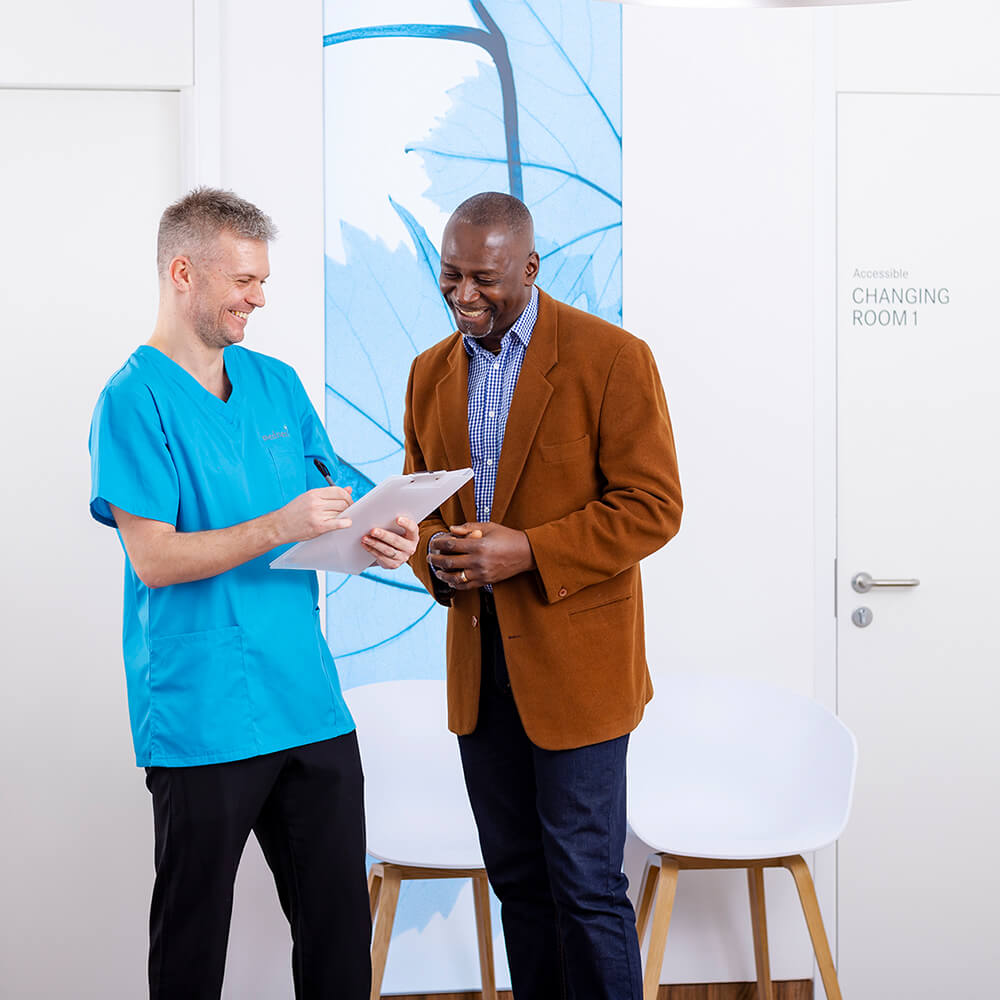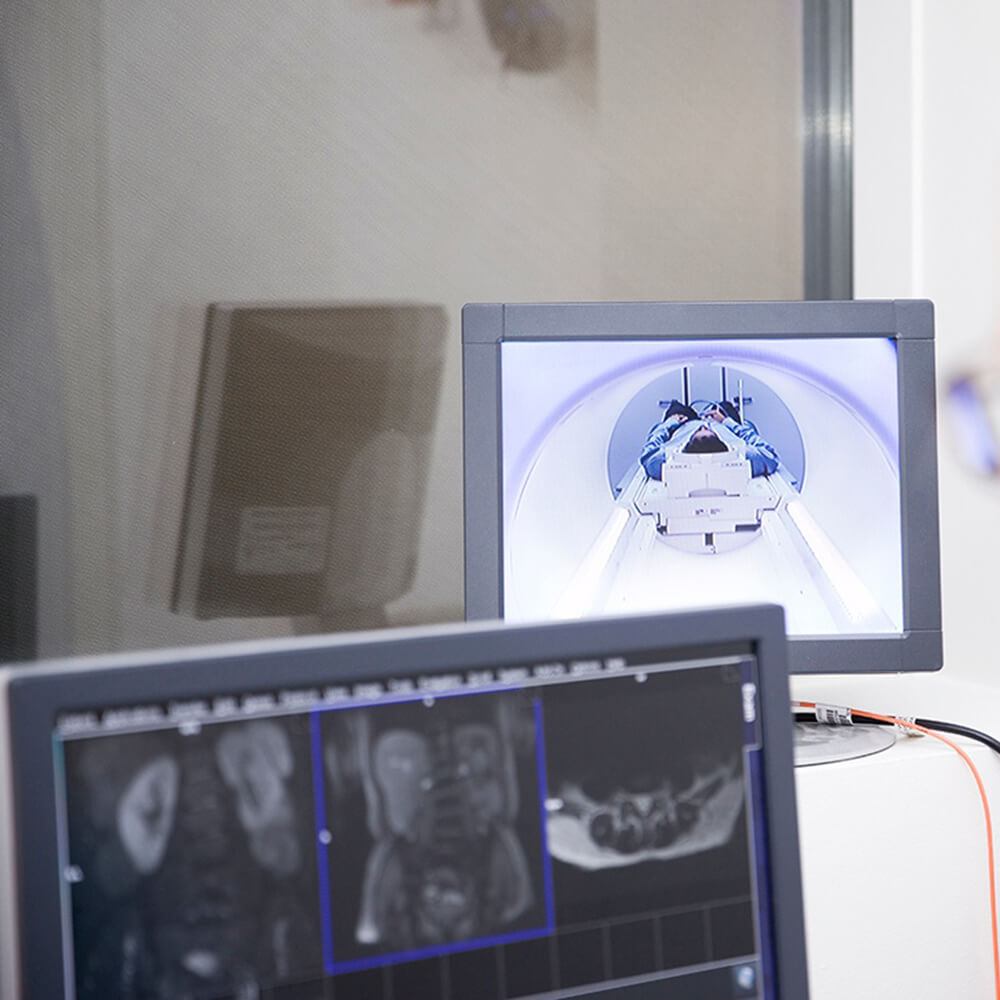If you are scheduled to have an MRI imaging examination, you may have questions spontaneous arise. You are welcome to find out more in advance on the website of my private practice for radiology and nuclear medicine in Berlin, Potsdam, Leipzig, Nuremberg and Hanover.
Here you will find an article addressing typical frequently asked questions as general information and for your orientation.
Should you have any further specific questions, please do not hesitate to contact me by phone on 030 – 30 80 99 65 or via the contact form.
The most frequent questions
compiled in our FAQ section
Both examination methods produce sectional images from the inside of the body, but differ in the physical method used.
Magnetic resonance imaging (MRI) is radiation-free and is performed in a strong magnetic field using high-frequency radio waves.
In contrast, computed tomography (CT) uses X-rays to generate images.
A patient’s examinations with both methods are possible on one examination day. If both examinations were to be performed by administrating a contrast medium, then a delay in performing the examinations would at least be easier on the kidneys and would be preferable if the examinations could be planned this way.
We request you to arrive at the practice to register about 15 minutes before your appointment. After completing the formalities and going through the information sheet, there is usually no need for further preparation before the examination.
The CT examination takes just a few minutes. The duration of the MRI examination depends on the region to be examined and the investigation; for example, most joint examinations usually take 15 to 20 minutes, MRI of the prostate with dynamic contrast medium examination takes about 40 minutes, and a whole-body MRI can take more than 60 minutes.
After a contrast medium has been administered, a further 30-minute stay in the practice for observation provided for. During this time, the image file will also be saved to a CD-ROM and handed over to you.
Please plan a time window of one to two hours for your appointment, depending on the examination.
If the examination is performed by injecting contrast medium, a modern lab is required for the assessment of kidney function – creatinine or GFR (glomerular filtration rate) value – especially in older patients over 50 and in patients with kidney disease.
In CT with X-ray contrast media administration, the TSH (thyroid stimulating hormone) value is additionally required for the assessment of the thyroid gland.
Your family doctor or referring specialist will arrange for the lab values to be determined. The lab values should not be older than one week. In case of known kidney disease, the creatinine or GFR value should be as up-to-date as possible.
Knowing your past health status is an important part of taking your medical history
Direct comparison with previous images is very valuable in order to detect even the smallest changes and, if necessary, to be able to assess the course of the disease.
Therefore, it is highly recommended that you bring any previous images, findings and surgery reports with you to your examination appointment.
Examinations that you have undergone in our center in the past are available for us in the archive. You do not need to also bring these.
In general, the examinations do not require any special preparation. It is recommended to wear comfortable and warm clothes for the examination.
All metallic items (hairpin, pen, belt, wallet, piercings, etc.) and electronic items (cell phone, bank cards, etc.) must be removed prior to the examination.
Sufficient hydration (fluid intake) supports renal function and helps accelerate contrast medium excretion.
Please inform us before the examination about allergies and intolerances as well as implants in your body.
For examination of the abdomen, you should not have eaten or drunk anything – except still water – up to four hours previously. Please take your medication as usual.
In principle, it is advised to refrain from eating prior to a planned contrast medium examination or definitely to limit yourself to a light diet.
The CT consists of a short ring and is performed very quickly. Patient claustrophobia is usually not a problem with this examination method.
The latest generation of MRI scanners used in my practice have a bright and air-conditioned tunnel opening of 70 cm diameter with a comfortable space. These MRI scanners are also well tolerated by most patients with claustrophobia.
In the case of a pronounced fear of constriction, it is also possible to have an anti-anxiety sedative administered before the examination, if necessary. However, you must bear in mind that you will not be able to drive a vehicle after the examination or will you be allowed to carry out any dangerous activities. Please bring an accompanying person with you to the examination or at least have them pick you up after the examination.
During the CT examination, there is only a slight noise caused by the fans whirring and movement of the X-ray tube.
In contrast, MRI produces knocking and humming noises to a greater or lesser extent during the measurements. Our latest scanners feature noise dampening techniques. Furthermore, you will receive comfortable headphones for the MRI examination, which significantly reduce the noise level and allow you to listen to relaxing music during the examination.
Movements during the scan cause unnecessary motion artifacts. It is therefore important to stay as calm as possible for precise image results.
The assistants will let you know when you can move between scans if you need to. A routine MRI examination consists of several scans and takes at least 15 to 20 minutes.
Please inform us whether you have metal parts or implants in your body and bring your documents (implant passport, etc.) with you for examination planning.
If you have a pacemaker, defibrillator implant, inner ear implant, insulin pump or neurostimulator, an MRI examination will not be performed for your protection.
Particular hazards in MRI can come from metal clips with a high iron content (used in the past) and metal splinters in the region of the eye and brain.
The vascular clips used today are usually non-magnetisable and harmless in MRI.
Metallic alloys, e.g. dental fillings, cause adjacent signal interference with a reduction in image quality, but are harmless in MRI.
Modern joint prostheses, vascular prostheses (stents) and material inserted on the skeleton (plates, screws, etc.) are mostly made of titanium and are also MRI compatible.
If an IUD (intrauterine device) or coil is inserted for contraception, MRI can be performed without any problems. A gynaecological check of the correct fit is necessary after the MRI examination and should please be observed.
In computed tomography, metal splinters and metal parts in the body generally do not pose a risk.
No! During the entire examination you will be looked after by my assistants and monitored with a camera for your safety. You remain in contact with the assistants via an intercom system and also have a bell in your hand during the MRI examination with which you can call attention to yourself at any time.
You are also welcome to bring an accompanying person to be with you during the MRI examination.
Tattoos and permanent makeup with pigments containing iron can change during MRI examinations and lead to heating in this area. The location and size of the tattoo as well as the time from which the tattoo or tattoo inks originate is certainly relevant. Professional studios in Germany have been regularly using iron-free inks since the late 1990s. Practices may differ in other countries.
Comprehensive patient information and individual assessment is carried out prior to MRI. During the MRI examination, you will be under constant observation by the assistant staff. With the bell in your hand, you can also attract immediate attention to yourself if you feel any tingling or warmth in the area of the tattoo. The examination can then be interrupted immediately and the specialist staff will take care of you.
Make-up products worn may also contain metallic components and significantly affect the image quality of the MRI examination. Please come to the MRI appointment with as little make-up as possible.
The need for administrating contrast media depends on the examination and the specific investigation.
In CT, the administration of contrast media is usually helpful for diagnostic soft tissue contrast. In contrast, MRI diagnostics of the joints usually does not require administration of contrast media.
Intravenous administration of contrast media is used for detailed imaging of the organs, nervous and vascular systems, among other things. With regard to inflammatory changes or in the search for tumour and metastases, the administration of contrast media may be indicated in both CT and MRI.
In CT, the X-ray contrast medium has a high iodine content for generating contrast. For the thyroid gland, iodine is also a key component in hormone production. A temporary decrease in thyroid stimulating hormone (TSH) may be possible following the administration of an X-ray contrast medium.
X-ray contrast medium is not a problem for a healthy thyroid gland. However, there are changes to or diseases of the thyroid gland that should not be exposed to excessive iodine intake without preparation, e.g. autonomy and Graves’ disease.
In case of suspicious thyroid values and uncertainty about possible thyroid disease involving risk, it may be possible to initially dispense with administration of an X-ray contrast medium or, alternatively, to switch to another examination method. In urgent cases, it is possible to block the thyroid gland with medication (perchlorate drops) before and after administrating the X-ray contrast medium and thus protect it from uncontrolled excessive iodine intake.
Differentiated and comprehensive clarification of questionable thyroid changes is recommended in advance of scheduled contrast-enhanced CT examinations.
The MRI contrast medium can be used without any concerns for the thyroid gland.
Contrast media is administered to patients for specific investigations; in particular, it can help deliver essential diagnostic information as an intravenous injection in cases of tumours, metastasis, and inflammation.
The MRI contrast medium contains gadolinium. Studies have shown that there may be slight deposition of gadolinium in the brain. To date, no diseases or symptoms have been associated with gadolinium deposition. However, in order to prevent risks, contrast media are used in a restricted manner.
Patients with kidney damage tend to refrain from MRI contrast medium injections, since the contrast medium remains in the body for a longer period of time and a few of these patients have experienced undesirable changes in the connective tissue.
Yes! Contrast media are administered with your consent after you have been informed of the risks and benefits.
Experts advise not to be too quick to reject a contrast medium examination, which is generally only used when there is a corresponding indication and investigation.
Fortunately, very few women need an examination with contrast medium after childbirth. If the indication is correct and urgent, contrast medium can be applied during breastfeeding.
Only very small amounts of contrast medium get into the breast milk, which can hardly be absorbed via the infant’s intestine. As an additional precaution, it is advised to pump and dispose of breast milk up to 24 h after administering contrast medium.
CT is not an examination method used in routine diagnostics during pregnancy due to the X-ray radiation. Only in case of life-threatening danger for the mother may a CT may be justified in an emergency.
The MRI examination as a radiation-free method, and if necessary is usually not problematic in the later stage of pregnancy – beyond the second trimester (14th week of pregnancy).
MRI is not performed in the first trimester of pregnancy, and should only be used when specifically indicated.
I will give you an initial assessment as soon as possible after your examination. In a detailed discussion, I would be happy to explain the findings to you in a comprehensible manner and, if necessary, give you advice.
You will then receive your image files as a CD-ROM.
The written findings with the detailed evaluation will be sent to you or the referring doctor within one week by e-mail, fax or post or in medically urgent cases immediately.
You can book MRI and CT appointments at my practice online at any time – very easily and uncomplicatedly. Book your preferred appointment quickly and conveniently here. As soon as you have made your reservation, you will receive your appointment confirmation by e-mail as well as an SMS reminder 24 hours prior to your examination appointment.
The appointment service is also available by phone on 030 – 30 80 99 65 on weekdays during opening hours from 7.00 am to 8.30 pm. The staff looks forward to your call and would be very happy to assist you with scheduling. Outside opening hours you can use our callback service.
Of course, you can also send us your enquiry by e-mail at info@primenostics.com. We will get in touch with you as soon as possible and would be happy to arrange a suitable examination with an appointment for you.
Diagnostic offerings in my practice
Information about the service offerings
I offer MRI examinations of all regions of the body in the highest quality and in line with the latest standards. A variety of examination protocols are at my disposal with which I make every effort so the examination is as pleasant and conservative as possible. Modern high-end scanners also offer plenty of space and comfort, even for patients with claustrophobia.
My range of services for you includes:


